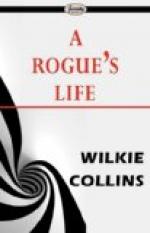“Fine morning, sir,” I said politely.
“Yes,” he replied in the gruffest of monosyllables.
I was not offended: I could make allowance for the feelings of a man who had been locked up by his own prisoner.
“Very fine morning, indeed,” I repeated, soothingly and cheerfully.
The runner only grunted this time. Well, well! we all have our little infirmities. I don’t think the worse of the man now, for having been rude to me, that morning, on the top of the Shrewsbury coach.
The next passenger who got up and placed himself by my side was a florid, excitable, confused-looking gentleman, excessively talkative and familiar. He was followed by a sulky agricultural youth in top-boots—and then, the complement of passengers on our seat behind the coachman was complete.
“Heard the news, sir?” said the florid man, turning to me.
“Not that I am aware of,” I answered.
“It’s the most tremendous thing that has happened these fifty years,” said the florid man. “A gang of coiners, sir, discovered at Barkingham—in a house they used to call the Grange. All the dreadful lot of bad silver that’s been about, they’re at the bottom of. And the head of the gang not taken!—escaped, sir, like a ghost on the stage, through a trap-door, after actually locking the runners into his workshop. The blacksmiths from Barkingham had to break them out; the whole house was found full of iron doors, back staircases, and all that sort of thing, just like the Inquisition. A most respectable man, the original proprietor! Think what a misfortune to have let his house to a scoundrel who has turned the whole inside into traps, furnaces, and iron doors. The fellow’s reference, sir, was actually at a London bank, where he kept a first-rate account. What is to become of society? where is our protection? Where are our characters, when we are left at the mercy of scoundrels? The times are awful—upon my soul, the times we live in are perfectly awful!”
“Pray, sir, is there any chance of catching this coiner?” I inquired innocently.
“I hope so, sir; for the sake of outraged society, I hope so,” said the excitable man. “They’ve printed handbills at Barkingham, offering a reward for taking him. I was with my friend the mayor, early this morning, and saw them issued. ‘Mr. Mayor,’ says I, ’I’m going West—give me a few copies—let me help to circulate them—for the sake of outraged society, let me help to circulate them. Here they are—take a few, sir, for distribution. You’ll see these are three other fellows to be caught besides the principal rascal—one of them a scamp belonging to a respectable family. Oh! what times! Take three copies, and pray circulate them in three influential quarters. Perhaps that gentleman next you would like a few. Will you take three, sir?”
“No, I won’t,” said the Bow Street runner doggedly. “Nor yet one of ’em—and it’s my opinion that the coining-gang would be nabbed all the sooner, if you was to give over helping the law to catch them.”




